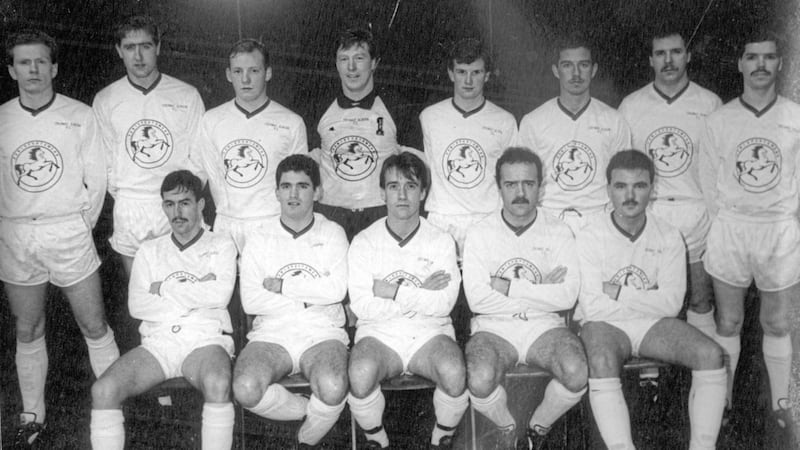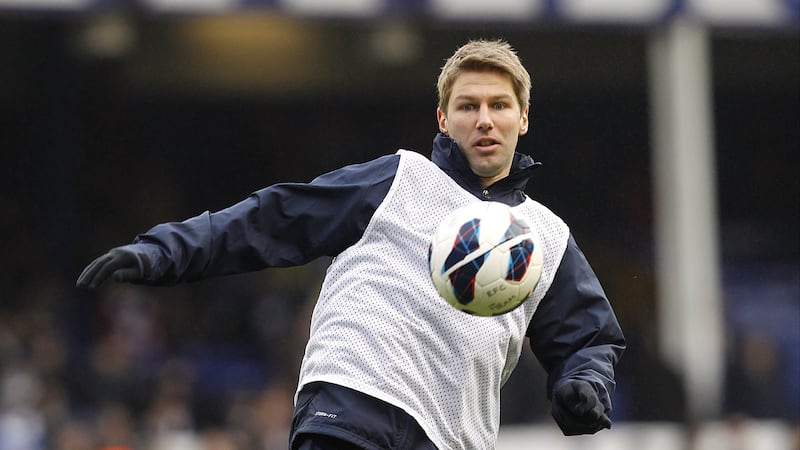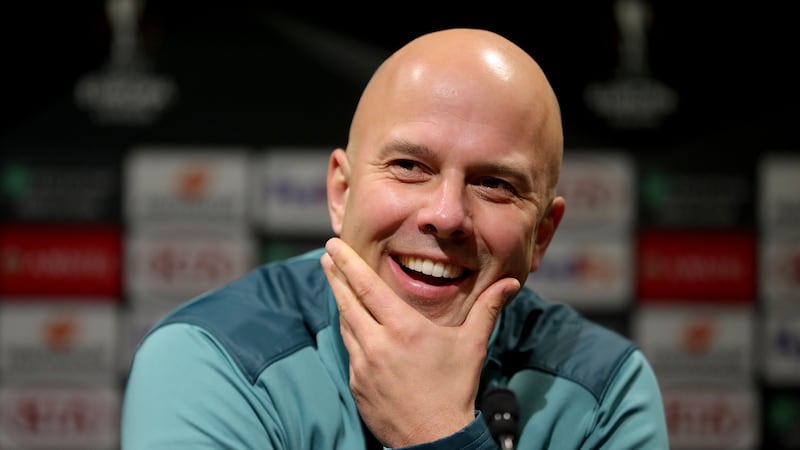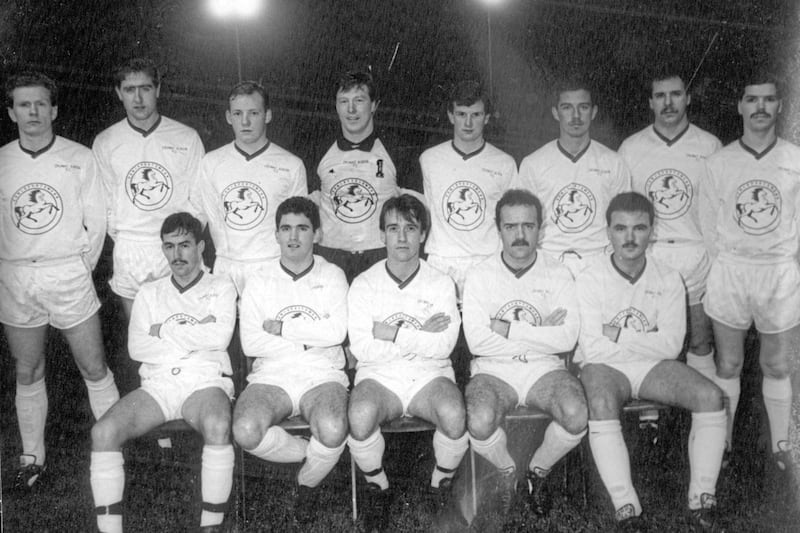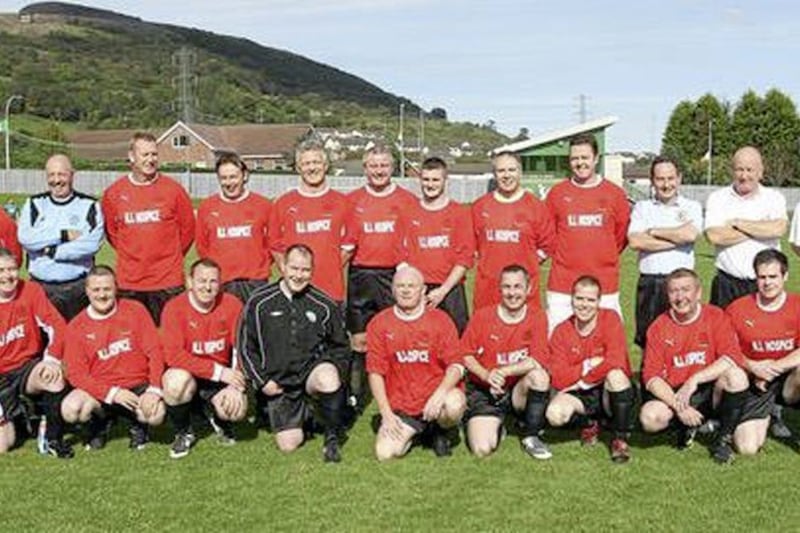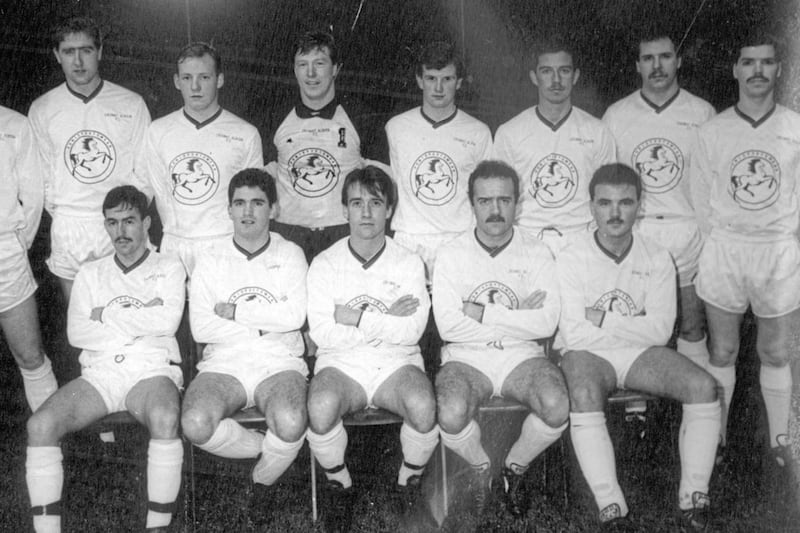GERRY Goodall remembers the 1978 Steel & Sons Cup final replay between Cromac Albion and Ballyclare Comrades should never have been played.
The Seaview pitch was a sheet of ice. On Christmas morning, the two sides drew 2-2, with Amateur League underdogs Cromac Albion squandering a two-goal advantage late in the game.
Cromac’s big chance, it was felt, was gone.
Ballyclare, one of the kingpins of the old ‘B’ Division, wouldn’t underestimate Cromac in the replay on New Years Day.
A Northern Ireland youth international, Goodall had left Irish League club Ards at the end of the previous season and joined his brother Jim at Cromac.
“Cromac hadn’t conceded a goal all the way through the competition and we were winning 2-0 in the first game with about 10 minutes to go,” Goodall recalls.
“We were rank outsiders. In betting terms we were maybe 12/1 and Ballyclare were odds-on.
“They came back and drew two-each. So we had to do it all over again on New Year’s Day. I remember the replay shouldn’t have been played because the Seaview pitch was like an ice-rink.
“Coming from a working-class background, I only had one pair of boots – Puma with nylon studs. Ballyclare who had money in those days went to SS Moore’s Sports Shop in Belfast city centre and got the whole team new Adidas, rubber sole boots, for the icy conditions.”
But it didn’t make a difference. Cromac, managed by founder member Sammy Watson, upset the odds in the replay by winning 4-1.
Brian ‘Diddler’ McKiernan scored two goals, Goodall buried a free-kick past Ballyclare’s Bobby Hinds before Kevin Armstrong came off the bench to make it four.
The club had reached the Holy Grail of junior football.
“A couple years had gone by after winning the Steel & Sons when I realised how it was the blue riband competition of junior football and it still is to this day,” said Goodall, now 59.
As winners of the Steel & Sons Cup, Cromac were invited to play in the Co Antrim Shield that season where they drew the mighty Linfield.
Ken McCurry put the juniors ahead at Windsor Park and forced the game to extra-time but were undone by a smart finish from Blues striker Gary Cully.
A year later, Goodall went back into Irish League football with Larne.
“Winning the Steel & Sons was one of the best days I had in football.”
He only played with Cromac for a couple of seasons but the camaraderie of those years have stayed with Goodall, now a football scout for cross-channel company Quorum.
“I was one of the youngest in the team. The camaraderie was unbelievable. We came from all different backgrounds but we got on great together. You had Kevin Quinn, a tough defender, Tom Sloan, ‘Diddler’ McKiernan and Patsy Hennessy was a great motivator. They were great times.”
June 13 1962 was the day Cromac Albion was born.
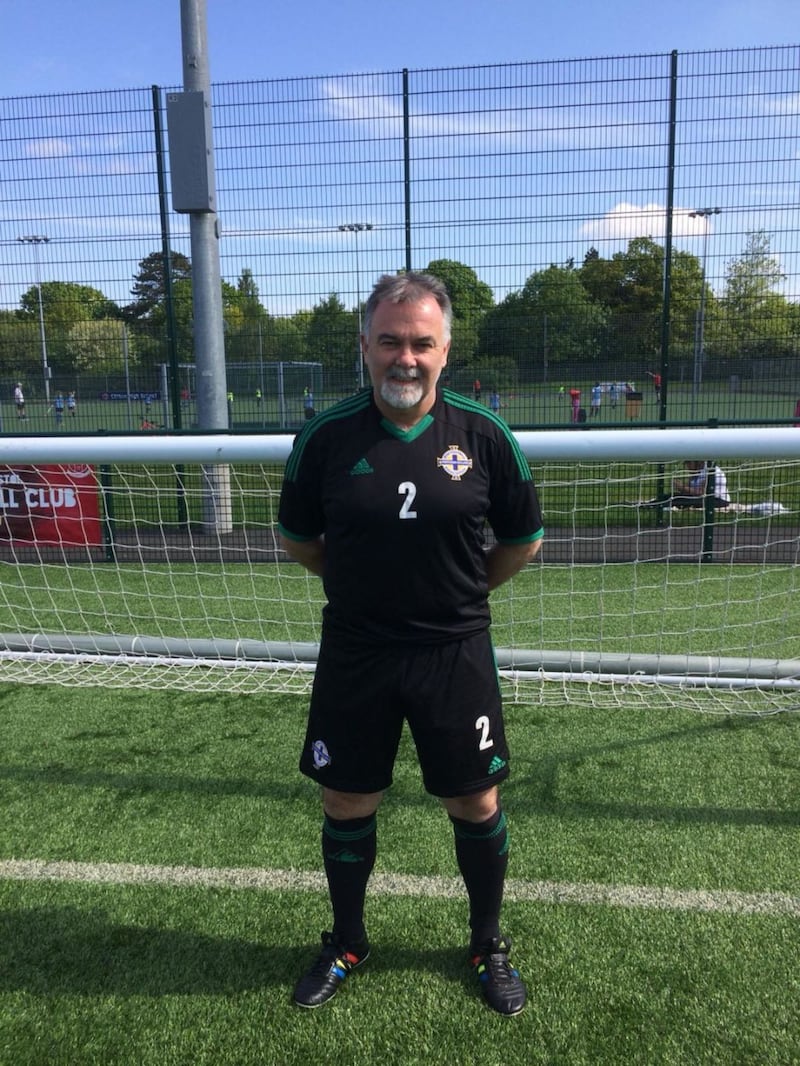
Formed by Watson and a group of BT engineers on Cromac Street, the club became one of the great junior clubs of its time.
In the early days they played in a north Belfast league and actually won the JF Kennedy Cup at Celtic Park on Christmas Day, ’62.
They gained entry in the Amateur League ranks in 1971 and played their home games at Strangford Avenue. The season before Watson guided Cromac to Steel Cup glory they clinched the Clarence Cup, beating Civil Service at STC’s ground in Monkstown.
In the summer months, Cromac were annual competitors in the prestigious Buncrana Cup.
Sammy Watson, the club’s cigar-chugging, sheepskin coat-wearing manager, had his own inimitable way of picking his team for the summer competition.
“We used to go up to the Buncrana Cup every summer and we’d stop off at ‘Dirty’ Dan’s café in Dungiven,” recalls club stalwart Henry Armstrong.
“It was in the café you kind of knew whether you were going to be picked to play because Sammy would have ordered 11 scrambled eggs and toast. Whoever got the the scrambled eggs knew they were playing, and I knew I wasn’t playing when Sammy ordered me a big fry!
“Another time I remember Sammy coming over to me and asked: ‘Henry, have you got your boots?’ I felt my chest swelling and I said: ‘Yes, Sammy.’
“And Sammy said: ‘Good, lend them to Pat because he forgot his.’
Cromac always drew their players from different backgrounds and all corners of Belfast. But, with the impending closure of football at Strangford Avenue, the club was soon without a home.
Former Cromac player and manager Joe Muckian handed the reins over to Ashton Gate manager Gerry Crossan.
Ashton Gate had outgrown the ranks of the Dunmurry & District League and the vast majority of their players made the step up to the Cromac team.
“The club needed a rebuild and when Gerry Crossan took over that was when the rebuild took place,” said club stalwart Henry Armstrong said: “If Gerry hadn’t taken over at that stage Cromac were finished.
“A lot of the existing Cromac players wouldn’t have been good enough to get on the new Cromac team so some left to get a game elsewhere on a Saturday.
“I, for instance, went to play for Rosario which was three or four levels lower. And with a good crop of players coming through the Cromac youth team [coached by Dominic McEnhill] you were never going to get a game because the firsts and seconds were brilliant teams.”
Backboned by Noel Ferran, John McAuley, Frankie Campbell, Pat Maguire, ‘Red’ Donnelly, Francie Murphy, Tommy Brady, Gerry Donnelly, Colm Quinn, Gerry Brown, Mickey Dornan and Frank O’Kane, Cromac had never won the Amateur League’s Division 1A title.
Under Crossan and assistant boss Eddie McCabe, they won two in a row – 1985/86 and 86/87 – seeing off great rivals Killyleagh on both occasions.
A year after their second league title success, Crossan handed the reins over to former players Noel Ferran and Jim McDonald who guided the side to the Border Cup in 1988.
Since being forced out of Strangford Avenue, the club found temporary residence at Cross & Passion school on the Glen Road in west Belfast.
The club clashed with the IFA over their new facilities. Cromac subsequently brought the IFA to court after the governing body ejected them from the Intermediate Cup.
Cromac lost the case and with the court fees tallying over £2,000, its members reluctantly decided to bring the curtain down and the club folded in 1991.
Nearly 30 years since the club ceased to exist, Henry Armstrong is organising a Cromac reunion dinner later this month.
“I saw a photograph that sits in my da’s house [the late Dessie Armstrong, former chairman],” explained Henry.
“There was wee Tommy Quinn and Paul McAteer in the picture, who passed away. I looked at the photograph and I thought: ‘Do you know something, we all seem to be getting older.’
“With the 40th anniversary of the Steel Cup [1978] win coming up and the 30th anniversary of the Border Cup coming up [1988], I thought it would be a good idea to have a reunion of all the people who played or helped Cromac through those years.”
Tickets for the Cromac Albion reunion at the Balmoral Hotel on Friday November 23 (7pm) can be purchased at Chaplin’s in the Park Centre (Unit 36) and Sports Company (Unit 5, beside Tescos) in Yorkgate. For further details contact Henry Armstrong Tel: 07889617355.
